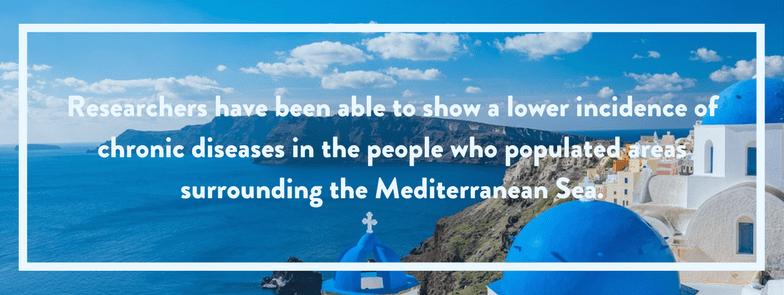By: Allison Callahan MS, RDN, LDN
The Mediterranean Diet and Why It’s a Great Choice: Highlighting Whole Grains
In today’s world we constantly hear about the latest fad diet that offers quick weight loss. But do these diets actually work? And are they backed by science?
Every day I work with patients who live with chronic diseases, many who have had little success after trying a fad diet. Often, they are discouraged when they look at the scale, feel powerless when they see their lab work and are unmotivated by their restrictive plan. But when I present an eating style that is based on science that allows them to enjoy a wide variety of nutritious foods all the while improving their health, they are inspired again.
In honor of National Nutrition Month, I want to promote the Mediterranean Diet—a plant-based eating style rich in produce, whole grains, seafood and healthy fats. The Mediterranean Diet also includes moderate amounts of poultry, eggs, cheese and yogurt (plus, a crowd favorite: red wine).
Where did the Mediterranean Diet come from and does it work?
So let’s back up. From where did the idea for the Mediterranean Diet come from and how do we know it’s good for us? The name spoils the mystery of its origins but as for its effectiveness, over time, researchers have been able to show a lower incidence of chronic diseases (like cardiovascular disease, obesity, type 2 diabetes, Alzheimer’s dementia and metabolic syndrome) in the people who populated areas surrounding the Mediterranean Sea.

For instance, the PREDIMED study showed that those following the Mediterranean Diet were half as likely to develop type 2 diabetes as other individuals. But the Mediterranean Diet doesn’t only reduce our risk of developing disease—it also can reduce our risk of recurrent disease. The Lyon Diet Heart Study showed that those who ate a Mediterranean style diet were 72% less likely than those eating a Western-American diet to have a second heart attack or to die from heart disease. There is the proof that it’s never too late to start your journey!
While we know there are tons of pieces to the puzzle of our health, we know that diet is one of those key pieces. What we also know: cuisine, lifestyle and well-being go hand-in-hand within geographic areas. So… why shouldn’t we take some pointers from the Greeks?

Foundations of the Mediterranean Diet
Produce
The foundation of the Mediterranean Diet is a variety of fruits, vegetables and whole grains. Meals are rich in fiber, vitamins and minerals, creating the potential for a positive impact on the risk of heart disease and cancers. Antioxidant-rich fruits like berries, pomegranate, figs and tomatoes, as well as nutritionally-dense vegetables like artichokes, arugula and eggplant are staples on a typical Mediterranean Diet food list.
Fibrous whole grains and legumes
The high-fiber nature of the Mediterranean Diet means this eating style can help to reduce cholesterol, improve bowel function, help manage weight and promote healthy blood sugar levels. Farro, 100% whole-wheat pasta and pita, lentils and chickpeas are commonly incorporated. Check out these high-fiber foods you can enjoy on the Mediterranean Diet:
- Farro: about 7 grams of fiber per ¼ cup
- 100% whole wheat pasta: about 6 grams of fiber per cup
- Lentils: about 8 grams of fiber per ½ cup
- Chickpeas (cooked from dry): about 14 grams of fiber per cup
Protein and healthy fats
If eating more chickpeas and berries doesn’t sound beneficial enough, the Mediterranean Diet swaps processed red meats and inflammatory fats—which are plentiful in the typical Western-American diet—for tons of fresh seafood and heart-healthy oils. Salmon, tuna, avocado and olive oils are ingredients frequently used in Mediterranean Diet recipes. These foods are rich in omega-3 fats necessary for a healthy heart and brain.
The Mediterranean Diet shows us the real power of food. Food can be tasty and enjoyable, all while nourishing our body and our lives.

Tips for getting started on the Mediterranean Diet
Intrigued? Want to know how to get started with your Mediterranean Diet meal plan? Here are some tips for transitioning towards a Mediterranean eating style:
- Tip 1: Plan your meals around a variety of colorful vegetables and fruits. In-season produce will be easier on your wallet.
- Tip 2: Stock up with nutrient dense snacks like carrots and hummus, Greek yogurt and berries, or nuts and pomegranate seeds.
- Tip 3: Eat fish and seafood more often than poultry; aim to eat red meats only once a week.
- Tip 4: Use olive oil in marinades, dressings and your favorite recipes.
- Tip 5: Experiment with new whole grains like faro, 100% whole-wheat pita bread, barley, oats and couscous.
About the Author
Allison Callahan MS, RDN, LDN serves at Terrebonne General Medical Center in Houma, Louisiana. She is a proud part of the Morrison Healthcare family. Find her on Instagram @lifeasieatit
Join the Morrison Healthcare Family

Looking for meaningful work helping people? Do you want to marry your passions and serving others? Check out available team member or management opportunities to join the Compass One Healthcare and Morrison Healthcare family. We believe in the Power of Food to change lives and are proud of the opportunities we have each day to help people and serve alongside world-class clients.
Morrison is a proud part of Compass One Healthcare and Compass Group USA.




